When it comes to affordable bathroom countertops, many materials offer a great balance between style, durability, and cost. Choosing an affordable countertop doesn’t mean sacrificing quality or aesthetics. Many budget-friendly options mimic the look of high-end materials like marble or granite without the hefty price tag.
Materials such as laminate, solid surface, ceramic tile, and even budget-friendly natural stone can provide a stylish appearance while staying within budget. Each of these options has unique benefits that make them suitable for bathrooms, offering resistance to moisture and ease of maintenance, which are essential qualities in a high-humidity environment like a bathroom.
Laminate countertops are one of the most affordable options available and are known for their versatility. Laminate is made from a plastic material that is adhered to a particleboard base, creating a lightweight yet durable surface. Laminate can be manufactured to mimic the look of various materials, including wood, stone, and even metal. Its low cost, combined with the ability to choose from countless designs and colors, makes laminate a top choice for budget-conscious homeowners. Additionally, it is water-resistant, making it a suitable option for bathroom spaces. With proper care, a laminate countertop can last many years without showing significant wear or fading.
Another budget-friendly option is a solid surface countertop, which is made from a blend of resin and minerals. Solid surface countertops are popular in bathrooms because they are non-porous, easy to clean, and resistant to stains. Unlike natural stone, which can be porous and require frequent sealing, solid surface countertops are ideal for high-moisture areas because they don’t absorb water or stains. This material is also repairable; if it gets scratched or chipped, it can often be buffed out, restoring it to its original look. Solid surface countertops come in various colors and designs, often replicating the appearance of more expensive materials like marble or granite.

Ceramic tile countertops are another cost-effective option for bathrooms, offering durability, easy maintenance, and countless design possibilities. Tile is resistant to water and heat, making it ideal for bathrooms. The wide variety of colors, shapes, and patterns available allows for personalized designs that can give the bathroom a unique and stylish appearance. Tile can be installed relatively easily as a DIY project, further reducing costs. While grout lines may require some maintenance to prevent staining, modern grout sealers can make this much easier and more manageable, ensuring the countertop looks fresh for years.
Prefabricated granite is another affordable option for bathroom countertops. Unlike custom-cut granite, which can be costly, prefabricated slabs are pre-cut to standard dimensions and often come with finished edges. This significantly reduces the price, making granite a more accessible option for those who love the look of natural stone but need a budget-friendly solution. Prefabricated granite offers the same durability, heat resistance, and timeless appearance as custom granite. Its natural beauty and resilience can add a touch of elegance to a bathroom while keeping costs under control.
Quartz is another popular choice for those seeking affordable bathroom countertops with a luxury feel. While not the cheapest option, quartz offers great value for the cost because it is durable, low-maintenance, and comes in a variety of colors and patterns. Quartz countertops are engineered stone made from crushed quartz mixed with resin, which gives them a consistent look and greater resistance to staining than natural stone. Since quartz is non-porous, it doesn’t require sealing and is highly resistant to water, making it an excellent choice for bathrooms. Additionally, the versatility of quartz allows for various colors and patterns, including those that mimic marble or granite.

Butcher block countertops, made from wood, can be an attractive and affordable choice for bathrooms as well, offering a natural and warm aesthetic. Wood countertops are surprisingly durable when properly sealed to resist moisture. While wood may require more maintenance than other materials to prevent water damage, it can add a cozy, spa-like feel to the bathroom. Butcher block also allows for customizations, such as stains or finishes that match other wood elements in the space. It’s important to use a food-safe sealant for wood in bathroom settings, as this will prevent mold and water damage while enhancing the wood’s durability and lifespan.
Concrete countertops have become increasingly popular for those seeking an industrial or minimalist look at an affordable price. Concrete can be poured on-site or prefabricated, offering a great degree of customization in terms of shape, thickness, and color. The durability of concrete is well-suited for bathrooms, as it is water-resistant and can withstand heavy use.
While concrete is naturally porous, it can be sealed to make it non-porous and easier to clean. This option is ideal for those who enjoy DIY projects, as a concrete countertop can be created at a low cost and personalized with different pigments, finishes, or even embedded materials for added texture.
Recycled glass countertops are another unique and budget-friendly option for bathrooms, combining sustainability with style. Made from a mixture of crushed glass and resin, recycled glass countertops are durable, non-porous, and easy to clean. They’re available in various colors and patterns, often featuring beautiful, mosaic-like surfaces that catch and reflect light, adding a distinctive look to the bathroom. Recycled glass countertops are also environmentally friendly, as they are made from repurposed materials, which appeals to eco-conscious homeowners looking to incorporate sustainable elements into their design.
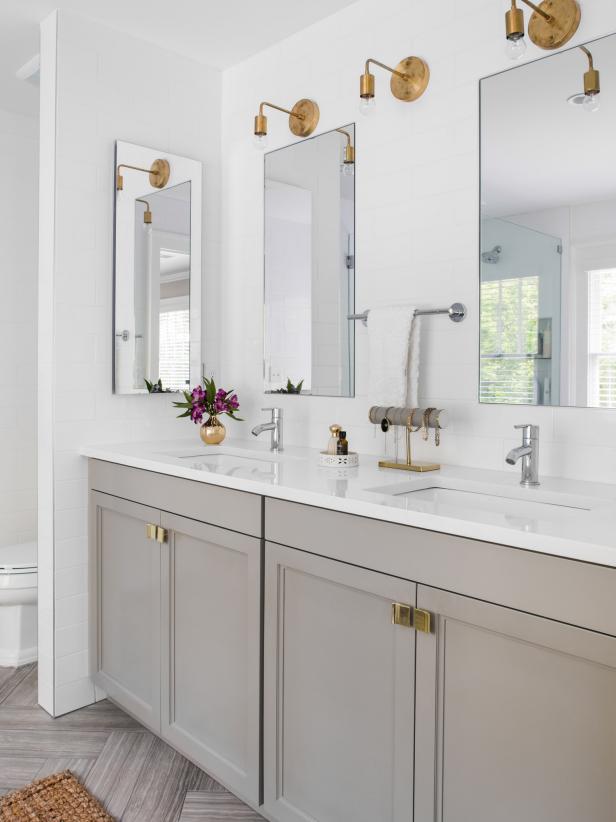
If you’re looking for a truly economical choice, consider peel-and-stick countertop materials, often made from vinyl or laminate. These products are applied directly over existing countertops, offering a quick, inexpensive solution for a bathroom makeover.
Peel-and-stick materials come in a range of styles that mimic wood, marble, and granite, allowing for a customized look without major renovation. While peel-and-stick countertops aren’t as durable as other materials, they can be a temporary solution or a good option for those who enjoy updating their decor frequently.
Marble-look porcelain slabs are another option for those who love the look of marble but are working within a budget. Porcelain is more affordable than real marble, yet offers a similar high-end appearance. These slabs are highly durable, resistant to water, and easy to maintain. They are also scratch-resistant and less porous than natural marble, making them suitable for the humid bathroom environment. For those who appreciate marble’s beauty but want a more practical and affordable option, porcelain offers the perfect compromise.
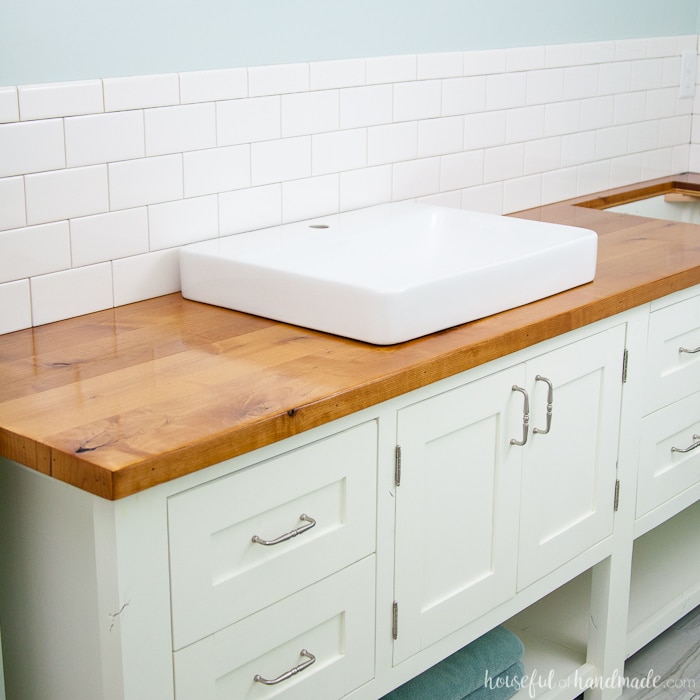
Cultured marble countertops are an affordable alternative to real marble and provide a similar elegant appearance. Made from a blend of marble dust and resin, cultured marble is non-porous, making it more resistant to water and stains than natural marble. It can be molded to various shapes and sizes, which is especially useful in bathrooms where custom cuts may be needed. Cultured marble is easy to clean and maintain, making it a practical yet stylish choice for a budget-friendly bathroom remodel.
For a farmhouse or vintage-inspired bathroom, soapstone is a unique yet affordable countertop material. Soapstone has a smooth, matte surface and is resistant to stains, heat, and moisture. Though not as widely available as other options, soapstone provides a distinctive, natural look that ages beautifully. It’s low-maintenance and does not require sealing, though occasional oiling can enhance its color and give it a richer appearance over time. This option works well for those who want a more natural, rustic feel in their bathroom design.
Lastly, modular countertops, or small pre-cut sections that fit together, are a cost-effective alternative to custom-cut countertops. Available in various materials, such as granite, quartz, and laminate, modular countertops are designed to fit specific dimensions and often come with pre-finished edges, reducing both installation time and cost. This can be particularly helpful in bathrooms where custom dimensions are required but the budget doesn’t allow for full custom fabrication. Modular countertops allow homeowners to achieve a high-end look at a fraction of the cost of custom countertops.
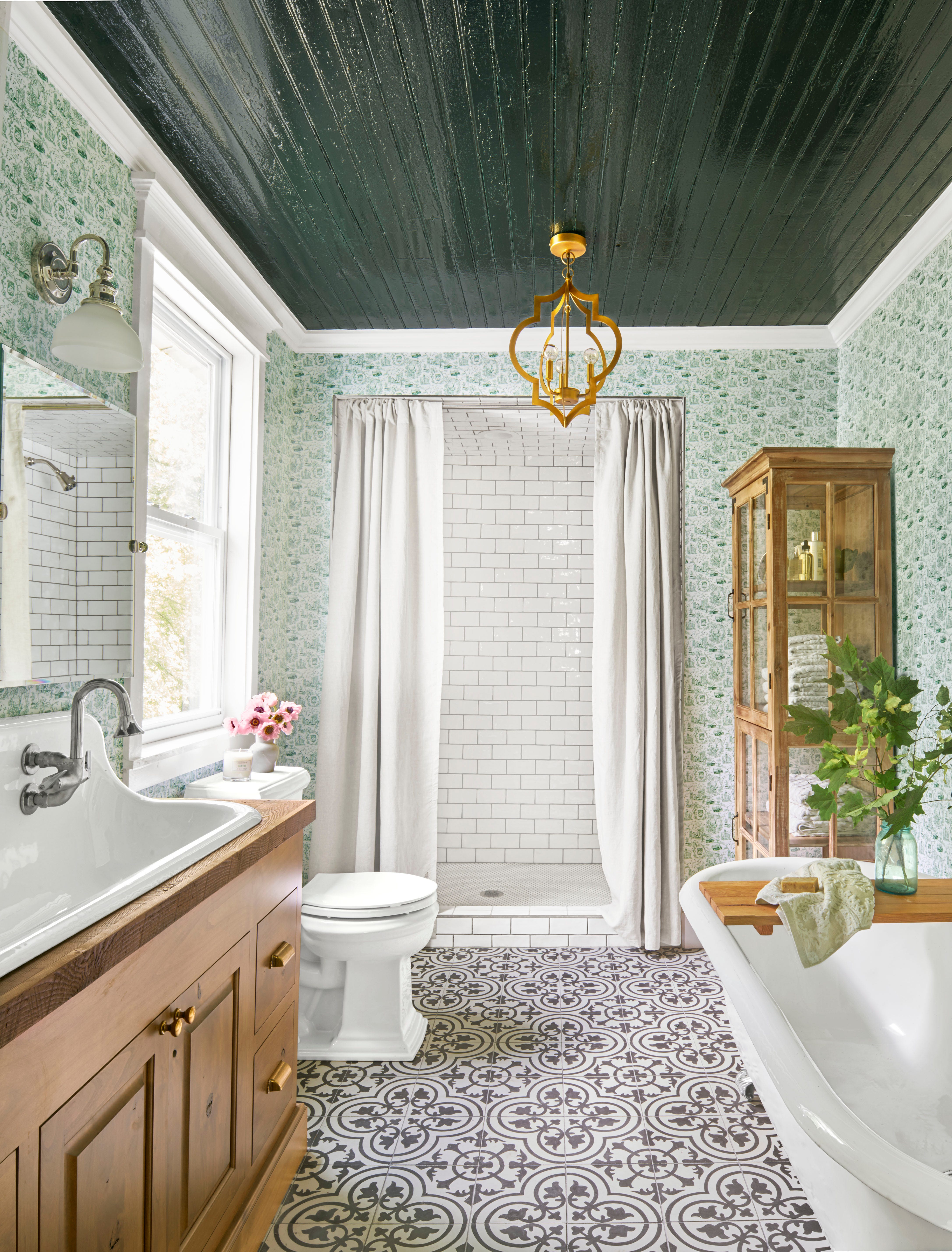
Common Mistakes to Avoid
Neglecting Proper Sealing: Some affordable materials, like wood and concrete, require sealing to prevent water damage. Failing to seal these materials regularly can lead to stains, warping, or cracks over time.
Choosing Unpractical Materials: Certain materials may look beautiful but require more maintenance than you’re willing to commit to. For example, wood and tile require more upkeep than laminate or quartz, so it’s important to consider how much time you’re willing to spend on maintenance.
Ignoring Moisture Resistance: Not all budget materials are suited for bathroom humidity. If you choose a porous material, make sure it’s sealed or consider alternatives like laminate or solid surface materials that handle moisture better.
Improper Installation: Installing countertops like tile or concrete yourself can be affordable but challenging. Errors in installation can lead to durability issues, so it’s often wise to consult a professional for these projects.
Overlooking Longevity: While saving money is great, choosing a material that doesn’t last can cost more in the long run. Balance budget considerations with durability to ensure you’re making an investment that will stand the test of time.

What is the most affordable countertop option for bathrooms?
Laminate is typically the most affordable countertop option for bathrooms. It is lightweight, water-resistant, and available in a range of colors and designs. Laminate can mimic the look of high-end materials without the expense, of making it a popular choice for budget-conscious homeowners.
Are wood countertops suitable for bathrooms?
Yes, wood countertops can work in bathrooms if they are properly sealed to prevent moisture damage. However, wood requires regular maintenance and resealing to prevent warping and mold growth, so it may not be ideal for everyone.
How do I maintain a tile countertop in the bathroom?
Tile countertops require regular cleaning, and it’s important to seal grout lines to prevent staining. Using a high-quality grout sealer will minimize maintenance and keep the tile looking fresh. For easy maintenance, wipe down the countertop after use and address any grout discoloration promptly.
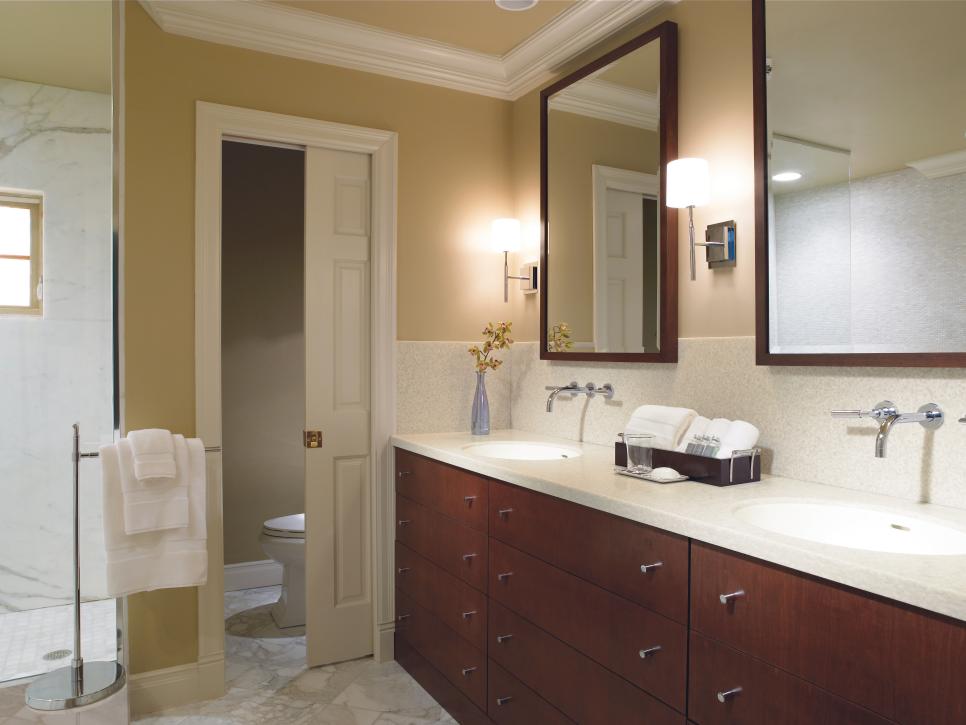
What countertop material is best for a high-humidity bathroom?
Non-porous materials like quartz, solid surface, and laminate are best for high-humidity bathrooms. They resist water damage and are easy to clean. Quartz and solid surfaces are durable and require little maintenance, making them ideal for bathroom environments.
Can I install a bathroom countertop myself?
Yes, some materials like laminate and modular countertops are relatively easy to install for DIY enthusiasts. However, materials like tile or concrete require specialized skills, so professional installation may be more practical to avoid mistakes and ensure durability.
Are recycled glass countertops durable enough for a bathroom?
Yes, recycled glass countertops are highly durable, resistant to water, and easy to clean, making them ideal for bathrooms. They also offer a unique aesthetic, with mosaic-like surfaces that reflect light beautifully. Regular cleaning is usually all that’s needed to maintain them.
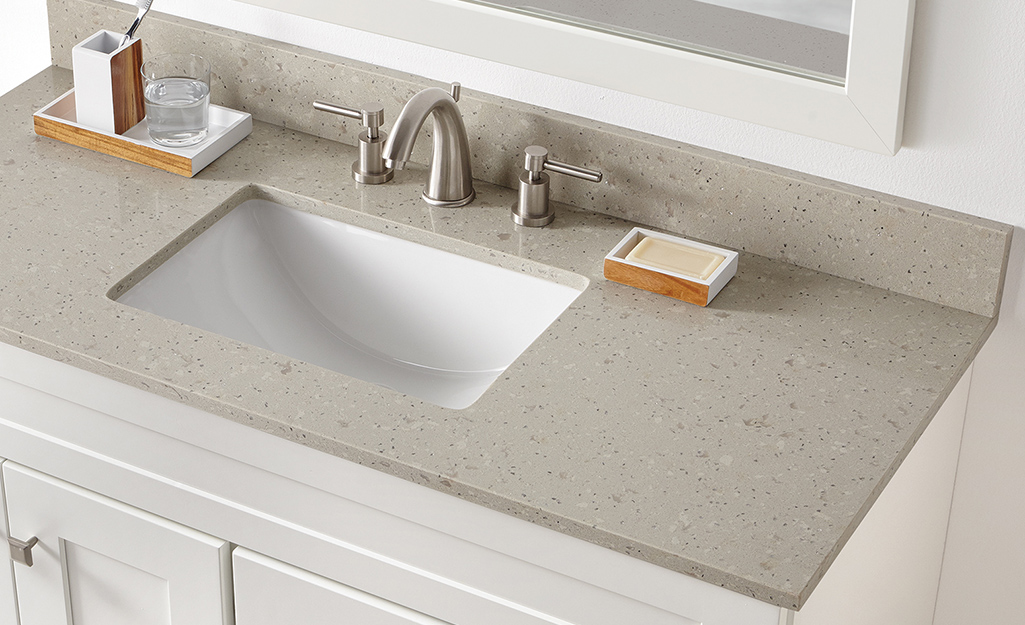
Bathroom Countertop Material Options
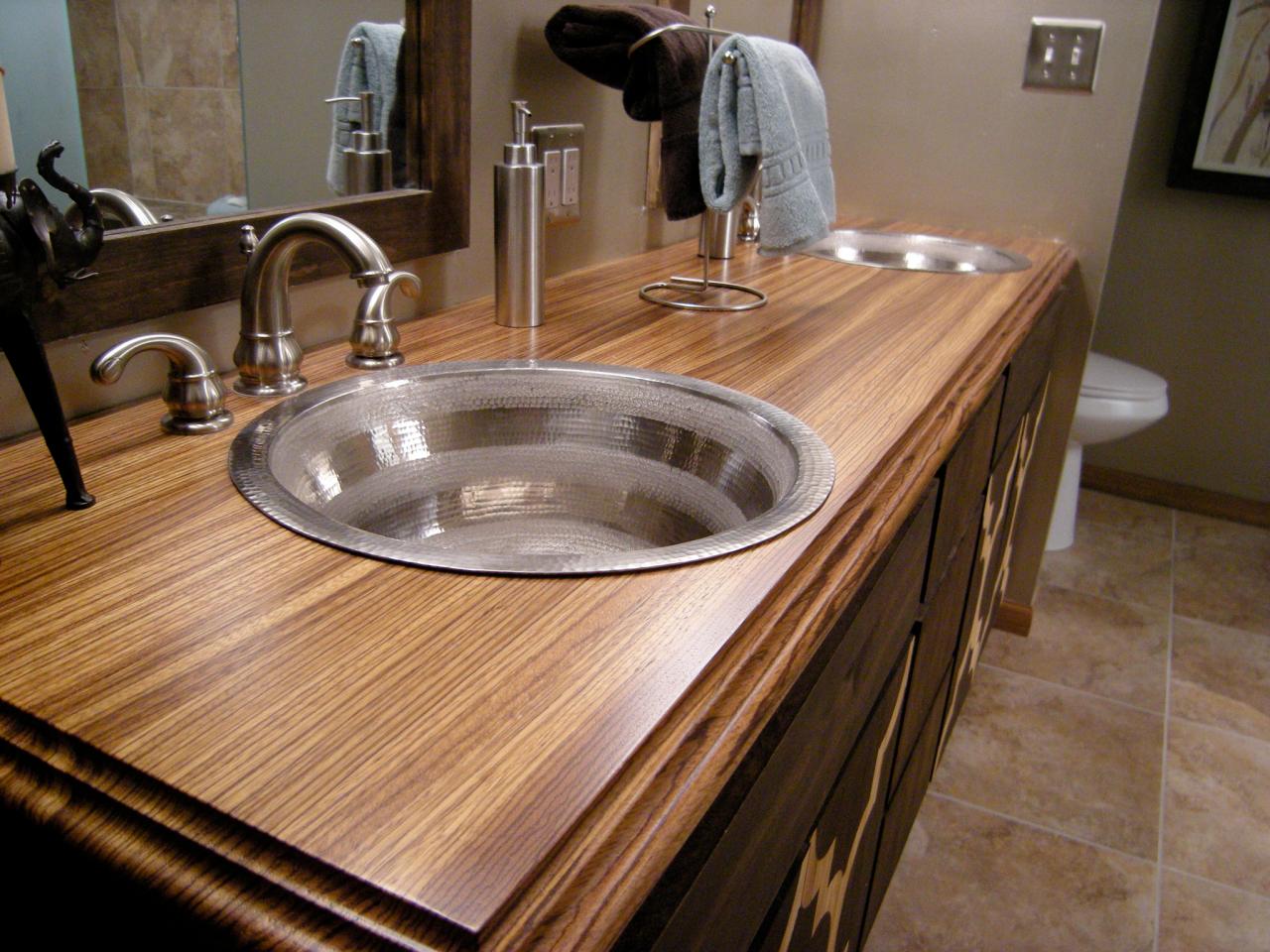
Related articles: